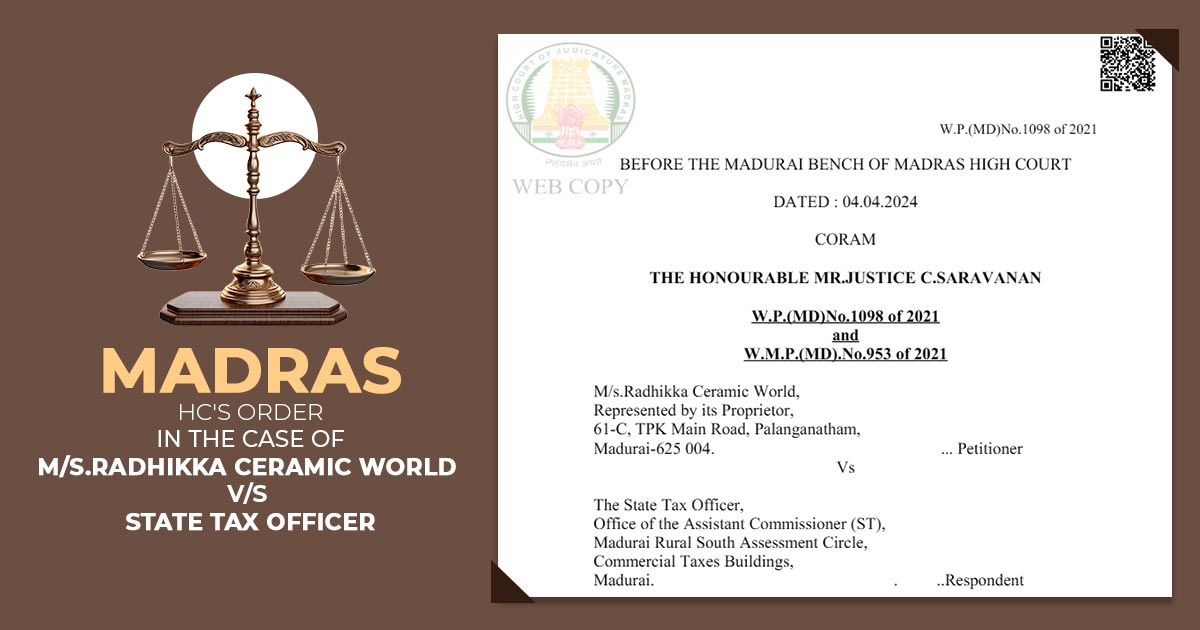
The Madras High Court in a ruling held that the Advance tax unutilized under the Value Added Tax (VAT) or Tamil Nadu VAT (TNVAT) has been permitted to be transitioned under Section 140 of the Tamil Nadu Goods and Services Tax Act, 2017 (TNGST).
A Single bench of Justice C. Saravanan, the language of Section 140 (1) of the TNGST Act, 2017 makes it clear that any amount of Value Added Tax and Entry Tax remaining un-utilized in the return will be permitted to be transitioned and this registered person is qualified to have the credit of such amount in his electronic credit ledger.
The applicant, Radhikka Ceramic World furnished a writ petition contesting the order passed by the Respondent- The State Tax Officer refusing the transitional tax that remained unutilized in the VAT returns furnished via the applicant for July 2017 dated 08.08.2017.
The applicant is in selling ceramic tiles and imported tiles from various states. Because of concerns for tax evasion in the tile industry, the applicant needed to file the tax in advance at Tuticorin port with 20% of the invoice value.
The same advance tax remained unused in the applicant’s VAT returns for June 2017. Therefore, the applicant asked to transfer this advance tax payment to the Commercial Tax Department in the state where the import occurred, following Section 140 of the TNGST Act, 2017.
It is proposed that there is no scope for refusing to transition these advance tax paid that had remained unutilized in the Return filed by the applicant for June 2017. Therefore, the impugned order is responsible to be quashed.
The petitioner’s counsel has drawn attention to the Madras High Court decision rendered in Avatar Petro Chemicals Private Limited Vs. Goods and Service Tax Council. Further reference was also made to the decision of the Division Bench of the Telangana High Court rendered in Magma Fincorp Limited Vs. State of Telangana.
On the opposite side, the Additional Government Pleader for the respondent claimed that only the input tax credit remaining unused as of June 30, 2017, is eligible for transition u/s 140 of the TNGST Act, 2017.
They claimed that the petitioner may, at best, ask for a refund for the advance tax paid but not utilized by the said date. Transitioning of unused advance tax is considered ineligible, as the advance tax does not correlate to the ITC.
It has been claimed that Section 141 (1) of the Tamil Nadu Goods and Service Tax Act, 2017, does not permit the transition of advance tax payments. Accordingly, the Writ Petition does not have merit, and the applicant may pursue remedies via the Appellate Authority Under Section 107 of the TNGST Act, 2017.
The bench stated that no scope for denying is there such an amount that was transited u/s 140 of the TNGST Act, 2017 while analyzing Section 140 of the GST Act.
Madras High Court decision in Avatar Petro Chemicals Private Limited Vs. Goods and Service Tax Council, where it was marked that ITC and/or capital goods credit that was legitimately claimed under the earlier tax regulations, which have now been integrated into the GST regime, cannot be restricted.
These credits should required to get authorized to be carried forward and utilized against tax obligations under GST if they were legitimately claimed but remained unutilized in either the CENVAT account or VAT returns before the execution of the GST. The system’s goal is to facilitate the industry.
The inherent limitations in the architecture of the GST Web Portal, or the inability to rectify a mistake in the TRAN-1, do not automatically mean that rightful benefits earned can be denied.
In the case of Magma Fincorp Limited, it was determined that if the petitioner had available credit on the date of switching from the VAT regime to the GST regime, and if the petitioner may be entitled to make a claim for this credit in other ways, then the second respondent should have interpreted Section 140 of the Act along with Sections 16 to 21 of the Telangana GST Act 2017 in a more purposeful manner.
Since the second respondent failed to do so, the matter needs to be reconsidered. Consequently, the writ petition was allowed by overturning the challenged order.
| Case Title | M/s.Radhikka Ceramic World V/S State Tax Officer |
| Case No.: | W.P.(MD)No.1098 of 2021 |
| Date | 04.04.2024 |
| Counsel For Petitioner | Mr.S.Karunakar |
| Counsel For Respondent | Mr.R.Suresh Kumar, Additional Government Pleader |
| Madras High Court | Read Order |